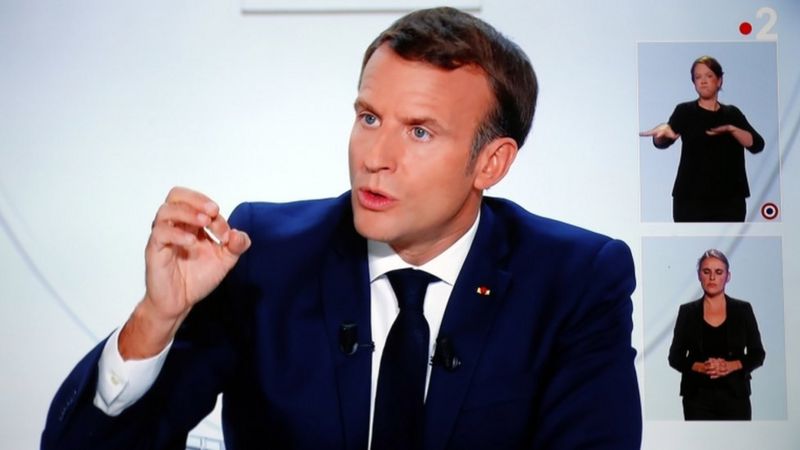(BBC) French President Emmanuel Macron has announced that people must stay indoors from 21:00 to 06:00 in Paris and eight other cities to try to curb the rapid spread of coronavirus in the country.
The curfew will come into effect from Saturday and last for at least four weeks, Mr Macron said in a televised interview.
A state of emergency has also been declared.
A further 22,951 cases of Covid-19 were confirmed on Wednesday.
Across Europe, governments are introducing new restrictions to battle a second wave of infections.
A partial lockdown comes into force in the Netherlands at 22:00 (20:00 GMT) and cafes and restaurants are closing.
Earlier on Wednesday, Spain’s north-eastern region of Catalonia said that bars and restaurants would close for 15 days from Thursday.
The Czech Republic has shut schools and bars. It has the highest rate of infection in Europe over the past two weeks, at 581.3 cases per 100,000 people
What are the new measures in France?
The night-time curfew will apply to the capital Paris and its suburbs as well as Marseille, Lyon, Lille, Saint-Etienne, Rouen, Toulouse, Grenoble and Montpellier.
Affecting around 22 million people, it will be applied for four weeks to begin with and Mr Macron’s government will seek to extend it to six.
The measures will stop people visiting restaurants and private homes during the evening and night-time, Mr Macron explained.
Residents will need a valid reason to be outside their homes during the hours of curfew, the president said. Essential trips will be permitted.
Schools will remain open and people will still be able to travel between regions during the day.
“We have to act. We need to put a brake on the spread of the virus,” Mr Macron said, adding that he understood that a curfew was a “hard” thing to ask people to do.
Anyone found breaking the curfew will be fined €135 (£121).
Additionally, no more than six people will be allowed to gather inside private homes, but exemptions will be made for large households, Mr Macron explained.
Businesses that suffer financially due to the new measures will be eligible for state aid, he said, adding that a second nationwide lockdown would be “disproportionate”.
“The message I want to send this evening is that I need each of you, we need each other, to find solutions,” the president said. “We will get through this, together.”
How bad is the situation in France?
President Macron said this wave of Covid-19 was different to the outbreak in the spring because the virus had spread to all parts of France.
The country managed that first major outbreak under control by introducing a national lockdown.
It then opened bars and restaurants in the summer and allowed foreign tourists to visit as part of an effort to boost the ailing economy. Schools re-opened and universities began teaching in person classes in early autumn.
But since August the number of reported cases has been rising and has accelerated quickly in recent weeks.
Wednesday was the third time in six days that France reported more than 20,000 new infections. Mr Macron said the new measures aim to reduce daily cases to around 3,000.
As with the first wave of Covid-19, there is concern that hospitals and intensive care units will become overwhelmed with patients.
On Wednesday the number of people admitted to hospital in France with Covid-19 rose above 9,100 for the first time since the end of June.
Furthermore, the country became the ninth in the world to surpass 33,000 deaths from the disease

